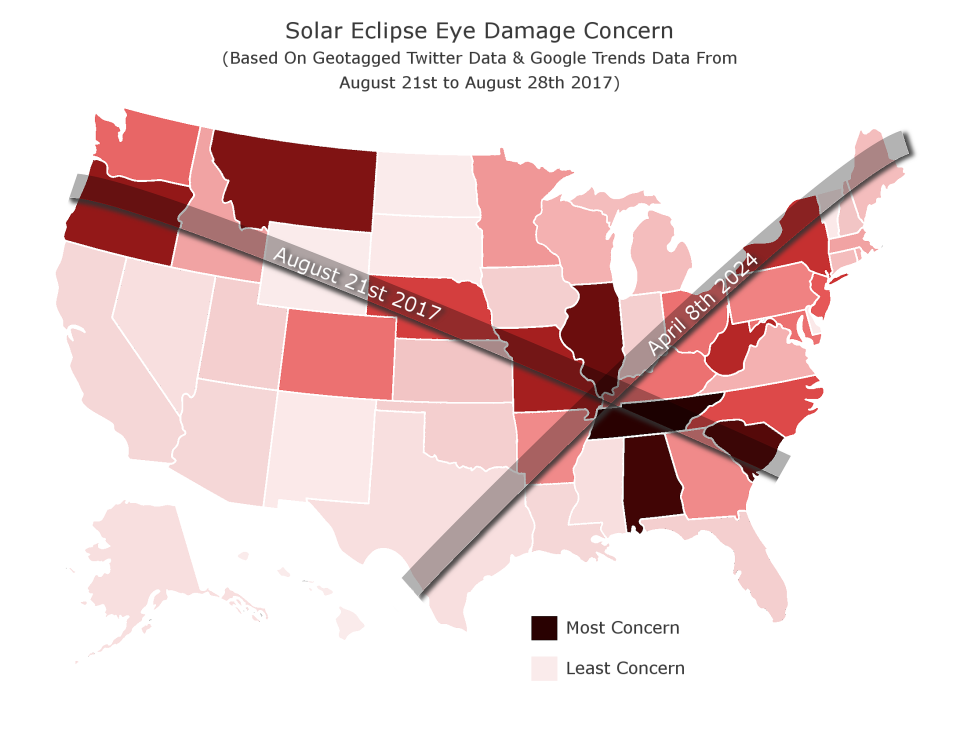Solar eclipse: Tennessee saw most eye injury concerns in 2017. How to be safe this year
Viewing a solar eclipse is an exciting event and the April 8 eclipse is already expected to be even grander than the one experienced seven years ago.
In the midst of the excitement, it is important to keep eye safety in mind. According to the American Academy of Ophthalmology, looking at the sun without the right eye protection, for even a short time, can permanently damage the retinas and even cause blindness, called solar retinopathy.
According to Oakley Forum, an Oakley news platform, Tennessee was the top state in the nation which expressed the most eye safety concerns following the 2017 eclipse. The states which expressed the most eye injury concerns follow the 2017 eclipse path, starting in the northwest and continuing to the southeast.
In order to safely view the eclipse, glasses must be compliant with the ISO 12312-2 safety standard. Additionally, old eclipse glasses may be reused depending on their condition, however regular sunglasses should not be used, no matter how dark they are.

How to Safely view the eclipse: Where to find eclipse glasses in Tennessee
The top 10 states with most eye injury concerns following the 2017 solar eclipse
Tennessee
Alabama
South Carolina
Illinois
Montana
Oregon
Missouri
West Virginia
New York
Nebraska
How to practice eye safety during the 2024 solar eclipse
NASA does not recommend looking at the sun through a camera lens, telescope, binoculars, or any other optical device or using a handheld solar viewer while wearing eclipse glasses, as the solar filters do the same job as the glasses to protect the eyes.
Wearing eclipse glasses and using optical devices at the same time can cause the concentrated solar rays to burn through the filter and cause serious eye injury, said NASA.
Other important safety guidelines to follow during a total solar eclipse according to NASA include:
View the sun through eclipse glasses or a handheld solar viewer during the partial eclipse phases before and after totality - when the moon completely obscures the sun.
You can view the eclipse directly without proper eye protection only during totality, you’ll know it’s safe when you can no longer see any part of the sun.
Immediately put your eclipse glasses back on or use a handheld solar viewer as soon as you see even a little bit of the sun reappear.
Tennessee Attorney General’s Office issues a consumer warning ahead of the eclipse
Despite not being in the direct path of totality, many Tennesseans will still have eyes on the sky come April 8.
The Tennessee Attorney General’s Office has issued a warning ahead of the event, advising consumers to be cautious of where they obtain they eclipse viewing eye gear.
"Past eclipses have resulted in viewers sustaining eye injuries, some severe and permanent, due to either looking directly at the sun with no protection or by using eclipse viewing glasses that had been falsely marketed as providing protection," said the attorney general's office in a news release. "Events of this nature often bring about unscrupulous sellers who may put profit over safety."
Wondering if your eclipse glasses are the real deal? The American Astronomical Society provides a list of reliable sellers and distributors whose products meet specific international safety standards.
Methodology
Oakley Forum utilized geotagged X and Google Trends data from April 21, 2017 to April 28th, 2017 to determine which states expressed the most eye damage concerns following the eclipse.
The phrases and search terms tracked included: solar eclipse eye damage, solar eclipse eye injury, solar eclipse retinopathy, solar retinopathy, eclipse retinopathy, retinopathy symptoms, solar retinopathy symptoms, eclipse retinopathy symptoms, and more.
Over 160,000 tweets were tracked.
Diana Leyva covers trending news and service for The Tennessean. Contact her at Dleyva@gannett.com or follow her on X, the platform formerly known as Twitter at @_leyvadiana
This article originally appeared on Nashville Tennessean: Solar eclipse: Eye injury concerns? How to view 2024 eclipse safely

